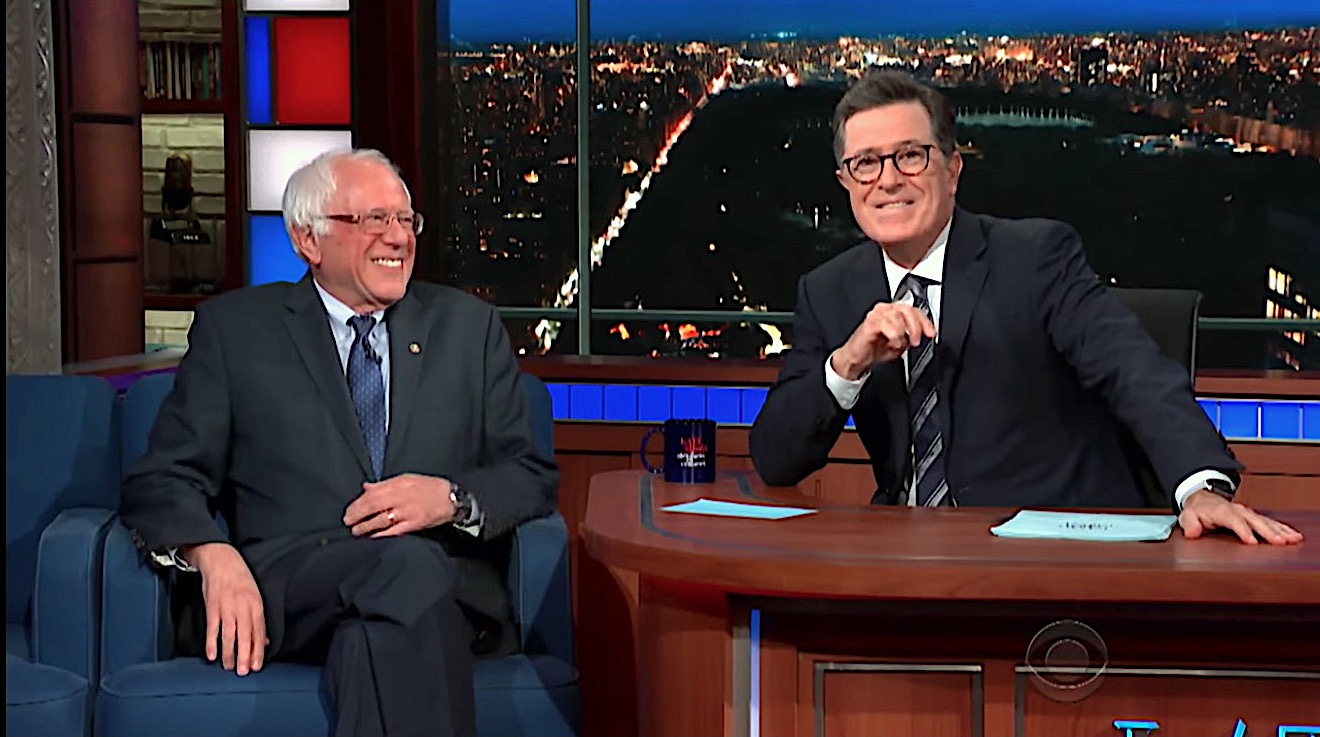Bernie Sanders doesn't tell Stephen Colbert he's not running in 2020


A free daily email with the biggest news stories of the day – and the best features from TheWeek.com
You are now subscribed
Your newsletter sign-up was successful
Before Sen. Bernie Sanders (I) officially won his Democratic nomination in Vermont on Tuesday, he sat down with Stephen Colbert on The Late Show. Colbert asked why he wasn't in Vermont — Sanders said he'd voted that morning — and what democratic socialism means for Sanders and his allies. Sanders said it meant a $15-an-hour minimum wage, a national right to health care, tuition-free public college, and clean energy.
"Other people have espoused those ideas without calling themselves socialists," Colbert noted. The Democratic Party has been "socialist-curious" since the New Deal, he added, so why adopt "socialist," a label "freighted with so much negativity"? Sanders said his ideas are now "mainstream" and broadly popular, "and I think also people, in their gut, understand that we're living in a very strange moment in American history, above and beyond Donald Trump — which is very strange." Colbert asked what could be stranger than Trump, and Sanders said the unbelievably voracious "greed of the people on top," America's yawning wealth inequality, and the limitless dark money in politics.
Colbert brought up the 2020 election, noting that a betting site has Sanders tied with Sen. Kamala Harris (D-Calif.) as the likely Democratic presidential nominee. "You want to lay a bet on who gets to face Donald Trump in 2020?" he asked Sanders, who said absolutely not. So Colbert asked if Sanders would "announce to the people here that you are not running in 2020," and Sanders said "no" to that, too. He added that he's focusing on ending the GOP's grip on power in Washington this year, and "it is too early to be talking about 2020." Watch below. Peter Weber
The Week
Escape your echo chamber. Get the facts behind the news, plus analysis from multiple perspectives.

Sign up for The Week's Free Newsletters
From our morning news briefing to a weekly Good News Newsletter, get the best of The Week delivered directly to your inbox.
From our morning news briefing to a weekly Good News Newsletter, get the best of The Week delivered directly to your inbox.
A free daily email with the biggest news stories of the day – and the best features from TheWeek.com
Peter has worked as a news and culture writer and editor at The Week since the site's launch in 2008. He covers politics, world affairs, religion and cultural currents. His journalism career began as a copy editor at a financial newswire and has included editorial positions at The New York Times Magazine, Facts on File, and Oregon State University.
-
 Regent Hong Kong: a tranquil haven with a prime waterfront spot
Regent Hong Kong: a tranquil haven with a prime waterfront spotThe Week Recommends The trendy hotel recently underwent an extensive two-year revamp
-
 The problem with diagnosing profound autism
The problem with diagnosing profound autismThe Explainer Experts are reconsidering the idea of autism as a spectrum, which could impact diagnoses and policy making for the condition
-
 What to know before filing your own taxes for the first time
What to know before filing your own taxes for the first timethe explainer Tackle this financial milestone with confidence
-
 ‘One Battle After Another’ wins Critics Choice honors
‘One Battle After Another’ wins Critics Choice honorsSpeed Read Paul Thomas Anderson’s latest film, which stars Leonardo DiCaprio, won best picture at the 31st Critics Choice Awards
-
 Son arrested over killing of Rob and Michele Reiner
Son arrested over killing of Rob and Michele ReinerSpeed Read Nick, the 32-year-old son of Hollywood director Rob Reiner, has been booked for the murder of his parents
-
 Rob Reiner, wife dead in ‘apparent homicide’
Rob Reiner, wife dead in ‘apparent homicide’speed read The Reiners, found in their Los Angeles home, ‘had injuries consistent with being stabbed’
-
 Hungary’s Krasznahorkai wins Nobel for literature
Hungary’s Krasznahorkai wins Nobel for literatureSpeed Read László Krasznahorkai is the author of acclaimed novels like ‘The Melancholy of Resistance’ and ‘Satantango’
-
 Primatologist Jane Goodall dies at 91
Primatologist Jane Goodall dies at 91Speed Read She rose to fame following her groundbreaking field research with chimpanzees
-
 Florida erases rainbow crosswalk at Pulse nightclub
Florida erases rainbow crosswalk at Pulse nightclubSpeed Read The colorful crosswalk was outside the former LGBTQ nightclub where 49 people were killed in a 2016 shooting
-
 Trump says Smithsonian too focused on slavery's ills
Trump says Smithsonian too focused on slavery's illsSpeed Read The president would prefer the museum to highlight 'success,' 'brightness' and 'the future'
-
 Trump to host Kennedy Honors for Kiss, Stallone
Trump to host Kennedy Honors for Kiss, StalloneSpeed Read Actor Sylvester Stallone and the glam-rock band Kiss were among those named as this year's inductees
